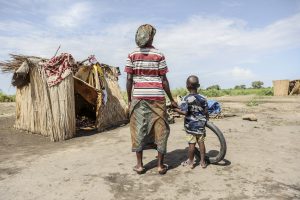Yemen: Remembering the World’s Largest Humanitarian Crisis
By Christine Monaghan
Photos by © Watchlist/Laura Silvia Battaglia
Yemen has been engulfed in conflict since March 2015. In just over two years, it has become the world’s largest humanitarian crisis. Two-thirds of the population—18.8 million people—are in dire need of humanitarian aid.
Yet, all parties to the conflict—the Saudi Arabia-led coalition and the Houthis (and their respective allies) are denying sustained humanitarian access and politicizing aid.
Warring parties are also directly attacking hospitals and clinics through airstrikes, shelling, looting, and occupation, and intimidating, threatening, detaining, abducting, and killing medical personnel. Additionally, they are shooting at and stealing ambulances and denying passage at checkpoints to people in need of lifesaving treatment or attempting to deliver essential medicines and supplies.
More than 50 percent of all hospitals and clinics have closed due to shortages of supplies and personnel or destruction caused by attacks. According to the ICRC, warring parties have carried out at least 160 attacks against hospitals, clinics, and health workers between March 2015 and March 2017.
The consequences on civilians, especially children, of two years of conflict, combined with denial of access to humanitarian aid, and attacks on hospitals, clinics, and health workers are devastating.
The country is on the brink of famine.
An estimated 3.3 million children and pregnant or lactating women suffer from severe acute malnutrition.
8.1 million children lack access to basic medical care.
And children are dying of preventable diseases, including malnutrition, diarrhea, and respiratory infections.
According to UNICEF, every 10 minutes, a child in Yemen dies of a preventable disease.
We traveled to Yemen between December, 2016 and January, 2017, and spoke with medical and humanitarian workers, parents, and children. We asked them about the impact of attacks on hospitals and health workers and denial of access to humanitarian aid.
Medical staff spoke of working in constant fear.
“We are afraid all the time. This hospital is close to buildings that are being targeted by the coalition airstrikes. Almost all the windows have been destroyed by bombs.”
~Save the Children interview with doctor, 2015
“The past year has been the worst year in my career. We have been working in an extremely insecure environment here as the hospital is located very close to areas targeted by airstrikes. We have often been forced to stay in the hospital when the airstrikes have been hitting the surrounding area to keep providing healthcare to patients who need our help the most, especially babies and children.”
~Save the Children interview with hospital manager, 2016
Humanitarian workers spoke of how warring parties’ denial of access to humanitarian aid has crippled the health sector.
"There was very little access to public health care before the war. Now there is essentially no access. It’s because of attacks on civilian infrastructure, [for example] bombing the electricity plant early on so that all hospitals and primary health care centers were running on generators. But there’s an extremely limited amount of fuel, so a large number of facilities had to close. If you need trauma care, it’s hard to access treatment, but there’s probably a better chance you will be treated then if you need chronic or routine care. Dialysis, cancer treatment, it’s almost impossible to get help for these issues anywhere in the country. But all of this is also because of the targeting of medical infrastructure. It’s a reality that happens every day and health workers are at great risk. For example, there was a double-tap on a hospital in Saada—they bombed the hospital and then waited until health workers started responding and bombed again. It’s a tactic to terrify the population."
~Watchlist interview with humanitarian worker, December 2016
And parents spoke of the anguish of watching their children suffer.
“The lack of medicine is the main problem for us. My son has pertussis (a respiratory disease) and as a farmer I can’t afford the cost of treatment. I would sell anything to save his life.”
~Watchlist interview with father of patient, December 2016
“We cannot afford healthcare. If any of our children gets sick, we cannot do anything for them. We do not know where to go. If one of our children dies, God forbid, we would not be able to afford to buy a shroud. Two of my daughters, 5 and 3 years old, have persistent coughs, and I can’t help them apart from giving them hugs.”
~Save the Children interview with mother of injured son, January 2017
Watchlist calls upon all parties to the conflict to immediately cease attacks against medical personnel.
Watchlist also calls on concerned UN Member States to take concrete measures to end impunity for violations of international law relating to the protection of medical care and the provision of humanitarian aid in armed conflict.
To read our full report, “Every Day Things are Getting Worse” The Impact on Children of Attacks on Health Care in Yemen, visit: https://watchlist.org/about/report/yemen
